
| Row 0 - Cell 0 |
The best games are never forgotten. Even if they sell poorly, they live on because gamers and critics can't stop talking about them. What about the next-best games, though? With hundreds of new titles being released each year, the low-selling games that aren't showered with awards are in danger of being swept under the rug. Here's a list of a few games that never got their moment in the sun.
Obviously this isn't an exhaustive account of every good game that's gotten the shaft. There was a half dozen or so major game systems this decade and I'm not going to pretend like I've played every game for each. I suspect all of you have found some gems in the bargain bin though so I'd love to hear your picks. Or you could just swear at me for forgetting a game - that works, too.
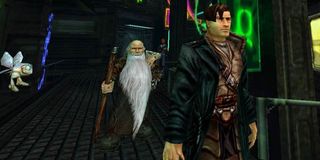
Ion Storm Dallas will be forever known as the studio that created the mega-flop Daikatana but few remember the next game they developed: Anachronox. The Quake II-powered role-playing game's combat system was inspired by Japanese console RPG's like Chrono Trigger but the story felt like Hitchhiker's Guide to the Galaxy. Some of the characters you recruited over the course of the game included a foul-mouthed robot, an over-the-hill super hero, and a miniaturized planet. It's no exaggeration to say that this was one of the funniest games of all time.
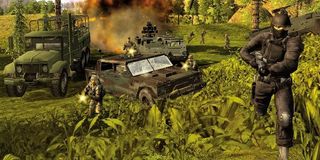
Some games go unnoticed not because they're bad but because they have the misfortune of being overshadowed by a similar product with a higher profile. Such was the case with Joint Operations: Typhoon Rising, a multiplayer shooter set in the jungles of the Phillipines that was released a few months after Battlefield Vietnam. The few that opted for Typhoon found a deep multiplayer game with a wide range of equipment, vehicles, and gameplay modes (including co-op missions). It supported matches of up to 150 players, an impressive player count even half a decade later.

CINEMABLEND NEWSLETTER
Your Daily Blend of Entertainment News
Releasing a game on the same day as the newest Call of Duty is pretty stupid, especially if said game is a new IP and as atypical as Mirror's Edge. Still, ME deserved more attention than it got. Its main gameplay twist - platforming in first-person perspective - was well-executed and gave an almost unprecedented level of physical immersion to the player. It's also one of the few games set in a futuristic dystopia that doesn't look exactly like fucking Blade Runner - that's gotta count for something. It's not a perfect game but it's one whose flaws are extremely fixable. Fortunately, EA's stated that they're going to make a sequel. Let's just hope they don't release it in the beginning of November.

Giants: Citizen Kabuto is essentially three games in one. Throughout the single-player campaign (and in multiplayer matches), you'll play three different species: heavily armed grunts with jet packs (Meccaryns), aquatic witches (Sea Reapers), and a giant cannibalistic monster (Kabuto). Though primarily an action game, Giants had real-time strategy elements as well; players built up bases and used them to unlock additional weapons/spells. The diversity of gameplay and well-executed humor should've made this game a classic in spite of some technical difficulties.
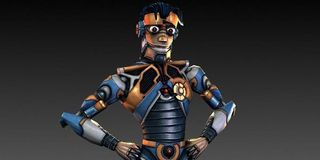
Pretty much every other list of underappreciated games on the Internet mentions Beyond Good & Evil. I agree that it deserved a lot more love than it received and eagerly await its sequel but instead of retreading what everyone else has said about BG&E, I'd rather discuss a similar game that even less people have heard of. In Scrapland, players control D-Tritus, a robot journalist investigating a series of murders in Chimera. He infiltrates high security areas by turning himself into different types of robots with unique abilities and avoiding security droids who can see through his disguise. To navigate the massive city, D-Tritus flies a variety of ships which he can upgrade with better parts and weapons to help him in dogfights and races. Scrapland also features a full multiplayer component with team deathmatch and capture the flag modes but finding someone to play with was tough, even when the game first hit stores. Scrapland didn't fit into a traditional genre so it never really caught on.
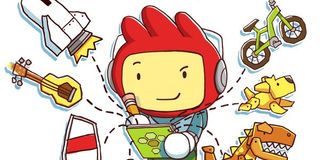
5th Cell must've gotten their share of weird looks from potential publishers when they pitched Scribblenauts. A puzzle game that allows you to summon any imaginable object sounds absurdly ambitious. The final product was exactly as stated, though. I'll admit that the controls were a bit shaky but the other main complaint of critics - that you can solve most puzzles just by using a small set of objects over and over - is baffling. Grinding your way through the game's levels with the same old solutions over and over just misses the point. The thrill is in dreaming up bizarre solutions and making them work. When a cat is stuck in a tree, you could just spawn a ladder, climb up, and grab her - but why not scare the cat out of the tree by summoning a kraken? Scribblenauts gives you the means to make your own fun.
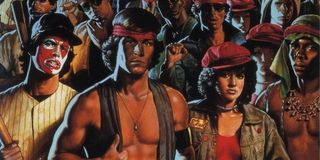
Usually when a studio makes a game based on a film, it's released to stores just as the movie is hitting theaters. It usually sucks, too. Rockstar bucked tradition with The Warriors, creating a kick-ass brawler based on a film over a quarter century old. While the last part of the game mirrors the plot of the film, the bulk of it is an all-new prequel story. You control The Warriors as they battle for dominance on the streets of New York. The deep combat system features three different fighting styles and eventually you're able to command other gangmembers during battles as well. Graffiti and robbery minigames and head-to-head multiplayer modes are just further proof that this wasn't just some limp piece of nostalgia.
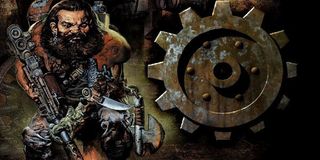
Arcanum was the first game to be released by Troika Games, a studio founded by former Fallout designers from Interplay. It wouldn't be a stretch to call Arcanum a spiritual successor to the first two Fallout games. It's an open-ended, isometric RPG with turn-based combat and skill-based progression. The biggest difference between this game and Fallout, its setting, was perhaps its biggest strength. Arcanum is set in a Tolkein-style fantasy realm that has been torn apart by an industrial revolution. The numerous conflicts between technology and magic offer scores of interesting quests. The attempt at real-time combat (optional, thankfully) didn't work well and the graphics were a bit dated by that point but nonetheless, it's a solid PC RPG that deserves a place on your shelf next to Baldur's Gate and Fallout.
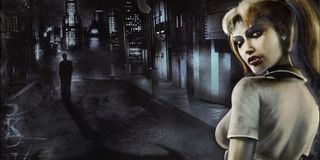
While we're on the subject of Troika, it's worth noting their final project, Vampire: The Masquerade - Bloodlines. Despite full 3D graphics and the use of a popular license, Bloodlines actually managed to sell less than Arcanum. It's too bad because it's the more ambitious and impressive of the two. It successfully fuses first-person shooter and third-person hack-and-slash with a full-blown RPG, years before Fallout 3 or Borderlands were released. True to the pen-and-paper version of Vampire: The Masquerade, Bloodlines allows you to choose your character's skills as well as their clan, the latter of which determines what magic you'll have access to and how you'll be perceived by the word. The Nosferatu, for example, are hideous beasts who must stick to the sewers to avoid drawing attention. Though bug-ridden when it shipped, the game has gotten considerably more polished over the years thanks to community patches. I'd like to think it would've sold a lot better if it were less broken when it shipped...and if it hadn't been released a week after Everquest II and a week before World of Warcraft. Or on the same day as Half-Life 2.
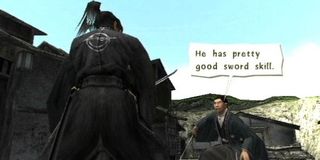
Most games are meant to be played once. A small handful are meant to be played a couple times. Sword-fighting game Way of the Samurai, however, is meant to be played over and over and over. It's a shorter game than most but it makes up for that with its numerous plot branches. The player is a wandering samurai who is caught between three factions battling for control of Rokkotsu Pass. Your actions determine which of these groups will ultimately prevail. You'll have to play it through at least seven times to experience all the different battles and endings. Some games pay lip service to player choice but it's the main driving force in WotS.

When playing through S.T.A.L.K.E.R.: Shadow of Chernobyl, I took a lot of "oh shit" breaks - moments where I'd have to pause and just take a breath because the game just made me jump out of my skin. S.T.A.L.K.E.R., an open-shooter set in the wasteland formed by a second accident at Chernobyl power plant, knows how to push your buttons. Traveling a countryside filled with mercenaries and rabid creatures intent on killing you is stressful enough but it's not nearly as bad as the forays into abandoned factories and research facilities. Mutants with telekinetic powers and invisibility await you in the dark corners and will make you lose your shit on several occasions. The realistic weapon recoil, limited backpack space, weapon decay and fatigue mechanics are all slightly annoying but are necessary to keep you grounded. The shooter genre's filled with Rambo wannabes and heavily armored space marines but S.T.A.L.K.E.R. made you feel very human and very vulnerable.
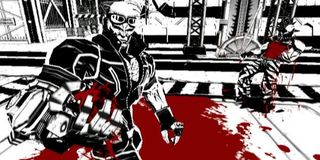
If someone tells you that an upcoming Wii title is going to make the console a destination for mature gamers, take them to Gamestop and point at the unsold stacks of MadWorld. People expected a revolution out of this gory beat 'em up and it only managed to sell 60K copies in its first month on the shelves. While it's a gory game, there's more to the game than just over-the-top executions. The comic book-style graphics, visceral combat, and deft story penned by designer Yasumi Matsuno (Final Fantasy Tactics, Final Fantasy XII) would've been enough to make this a hit on any other console.
Staff Writer at CinemaBlend.

Could Zack Snyder's Rebel Moon 3 Happen? Where Things Leave Off With Part 2 And What The Writer Told Us About The Potential Threequel

I’m Still Annoyed Star Trek: Lower Decks Was Canceled, But There Is One Way This Could Turn Out To Be Good News

32 Disney Company Movies We Don't Talk About Nearly As Much
Most Popular







